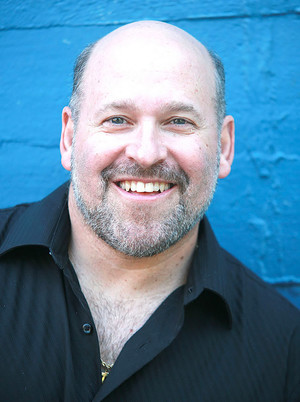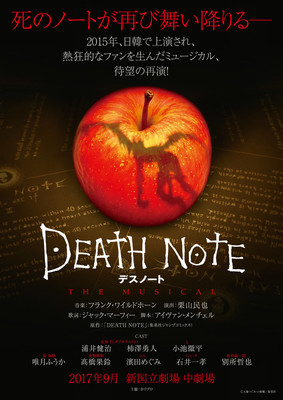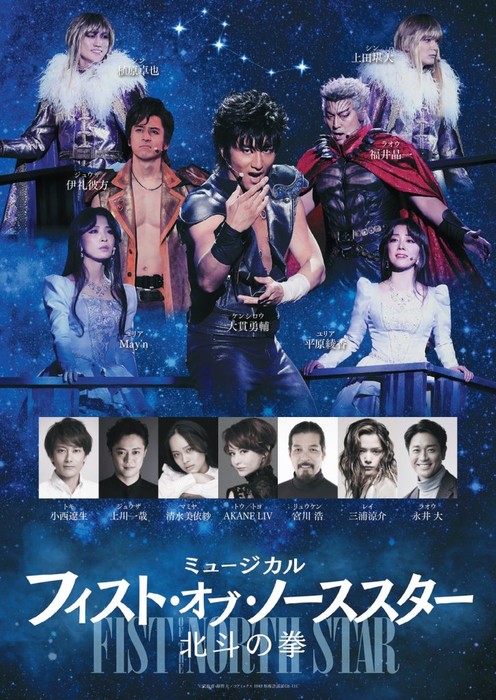Frank Wildhorn, Composer of Your Lie in April: The Musical
by Andrew Osmond,
In the last decade, Wildhorn has composed musical adaptations of three very different manga: Fist of the North Star, Death Note, and Your Lie in April. While he acknowledges that Fist of the North Star may be a tricky sell in the West, he aims to bring both others to New York.
Before that, though, Your Lie in April: The Musical is opening in London for a twelve-week run from June 28 at the Harold Pinter Theatre, following previous London "concert" performances in April. Your Lie in April: The Musical is composed by Wildhorn, with lyrics by Tracy Miller and Carly Robyn Green, and the English-language book is by Rinne Goff. The arrangements and orchestrations are by Jason Howland, and the director is Nick Wiston.
In a Zoom interview from his Hawaii home, Wildhorn talked about how he was introduced to manga by his son, how he needed to learn why the boy couldn't just kiss the girl in a Japanese teen romance, and whether he's on Team Kosei or Kaori when it comes to making music.
I understand you were introduced to Your Lie in April by your son.

Frank WILDHORN: Yeah, who also was the reason I did Death Note! I have a home in Japan and next year, I will have had 25 shows there. But to tell you the truth, I wasn't really as versed in the manga world as I am now when all of this started with Death Note.
When I was given it, I told my son, who is versed in all of this stuff. And he said, "Dad, this is so much hipper than anything you do in New York, you need to tell them yes and start doing this." I've now done Death Note, Your Lie in April, and Fist of the North Star and there's more coming, that's for sure. Because the source material is so wonderful. I always tell people, it's kind of like learning Greek mythology if you never knew what it was. The stories and the characters are so great.
After the success of Death Note, another of the big producers in Japan, TOHO, asked me to do a manga-based musical for them. And it was my son Justin again who said that on Netflix, there's a series called Your Lie in April, watch it. And after watching it, I literally went to the piano and wrote it basically in a weekend.
What were the main elements of Your Lie in April that you felt made it especially good material for a musical?
WILDHORN: Well, first of all, it's a love letter to music itself. It's really about the power of music to heal, to help create memories that stay with us in our life, about music as being like a bridge between childhood and adulthood, or between here and the Ever After.
I also fell in love with the bigger than life characters, and the stakes are so high in their lives. That's part of my philosophy of why things make a musical anyway. And then of course, you just fall in love with the story and how unique it is and my Japanese wife keeps telling me this story has the spirit of Japan. And it has it in a way that the Japanese want very much to share it with the world.
And to tell you the truth as a Western guy, I'm not sure I always understood that, that's a subtle kind of a thing. But my wife says to me all the time that this show has a spirit of Japan in it, that people are going to love to understand and share. I'm trusting her very much as I did my son, and now I'm talking to you, so that's all good.
You've adapted a massive range of stories into musicals in the past. Did you find Your Lie in April comparable to anything you've tackled before?
WILDHORN: There are themes that are universal in this story: the coming of age, dealing with all the garbage we have to deal with when we're teenagers, getting disappointed and dealing with disappointment and failure, and how do we do that.
But the way it's approached, and the spirit that it's approached in, which, of course, is Japanese and Eastern, is a little different. When I was working with my Japanese collaborators, I would always say, He's got to kiss the girl here!. And they would say, No, no, no, that's not the way, we don't do that!. And it's just interesting, right? And so, what Rinne Groff has done is wonderful; it is not just a translation but also an adaptation of the story for a Western audience without losing its Japanese spirit, which is not easy to do.
One of the themes in Your Lie in April is the contrast between Kosei, who has been taught to be accurate and mechanical and follow the rules of music, and Kaori, who is the reverse, a free spirit. As a creator yourself, does that resonate with you, and do you feel more sympathy towards one side or the other?
WILDHORN: That's a very interesting question. So, I'm a self-taught jazz musician. I started in jazz groups, funk groups, and pop groups in the '70s. I didn't really know the rules so well. And certainly when I got into theatre, I didn't know any of the rules, I just kind of did what I did. I guess musically, Kaori and I are kindred spirits,
But my life changed last year. I was the first American to have a debut with the Vienna Symphony Orchestra, one of the great orchestras in the world. It's called the Donau Symphonie (Danube Symphony). And, of course, when you're writing for 97 musicians, you kind of have to stay in the lines in some way, right? And that requires a discipline that I don't usually have when I'm doing pop or jazz or R&B and stuff like that. So, I can relate to Kosei, too, [because of] that experience.
You first encountered Your Lie in April through the anime. Were you influenced by the particular selections of classical music that were made in the anime?
WILDHORN: I was actually going back to the original manga, using several pieces of music that were identified in it. We wanted to respect that, and then we wanted to expand upon that. I think as the show keeps going, I will probably add more classical music. In act two, Zheng Xi Yong, who plays Kosei and is a classical pianist, the real deal, sits down and plays a Rachmaninoff piece and blows the audience away. He got a standing ovation playing the piano in the concert version. It was quite a spontaneous, wonderful reaction.
I think this show opens the door to classical music, in a hip way to young people who may not think it's so hip. I think the way we do it, we make them comfortable with it. And we use it within a pop and rock vocabulary. So many young people are now being introduced to some of these pieces by Beethoven and Rachmaninoff that maybe they wouldn't have if we hadn't done this. And I'm kind of proud of that.
This is your third musical adaptation of a manga, following Death Note and Fist of the North Star. All three of these titles are extremely different from each other. Having adapted all of them, do you think they have any kind of common style or approach; is there something that they share?
WILDHORN: Well, they're different, but visually, there is a style. Just what people look like in anime is pretty consistent, no matter what the story is, so they already have something in common. That's important because some of those visual things inspire music, so I'm inspired by a person's face, or an action that they take, and the way it's stylized in manga, there is a similarity to that.
With that said, these stories could not be more different from each other. Death Note is bigger than life. Your Lie in April is a very human story, not supernatural. And I think that its charm is in the fact that you can be eight, you can be eighty, you could bring your kid, you can bring your mom. You can relate to the characters, their situations, and their stories. So there's a human element to that that's very different from Death Note.

And Fist of the North Star [pictured right] is just absolutely bonkers. I mean, it's like Mad Max, you know what I mean? I don't know if that will translate like the other two to the West. We haven't gotten there yet. And I am working on some new ones that may get there first because they're big, big titles.
But I gotta tell you, I feel like this kid who opened the box, and there's a million stories I never knew before. And because I'm certainly the first Western composer to have this success with this stuff in the East and now bringing it West, that's kind of become a cause in my life now. There's also the fact that doing these things made me discover this enormous, beautiful well of talent of the Asian community outside of Asia. We are putting so many Asian people to work as actors, designers, musicians, and musical directors.
Japan has a huge tradition of musical theatre, which you've worked in yourself. How would you compare it to the musical theatre that Westerners know?
WILDHORN: My life is incredibly international. Since 2000, 2001, I've been the kind of international guy with so many shows in Asia. And I learn from the audience. I get to go to the shows and workshops, and I learn from the feedback. And obviously, it's all local when you do theatre because the audiences are different, and they come from different places. Depending on where in the world you're playing, you have to understand the audience; you can push the audience, but you have to know what you're talking about with them.
With Takarazuka, I am the first Westerner to be commissioned to write original shows for them. [Wildhorn's wife is the Takarazuka star Yōka Wao.] I've now done four or five Takarzuka shows; I have a wonderful relationship there. And, of course, because it's all women playing all the parts, that in itself, culturally, is a strange kind of thing. Then you learn what that is, and you learn the rules and how to do that.
But in Japan, from Kabuki to Takarazuka, to the ways of the geisha and the samurai, all of these wonderful, bigger-than-life romantic things come into play. And I just tried to be a student of that. And then, when I'm writing for that audience, I tried to both be respectful of the history and, then, as a Westerner, put my own spin on that.
But certainly, I feel that I am at the tip of the spear of manga. What we're about to do with it, and God willing, we will have success with it. And then, of course, we'll bring it to New York. That's the plan. We have wonderful producers for these shows.
Your Lie in April is a strange title, right? It's not Death Note. And so we've got to get the word out. People went to the concert performance in London—we had six thousand people in three days—and they loved it. But I do know we have a mountain to climb here. We need to get the word out because it's still a new thing. So please help us!
discuss this in the forum |
this article has been modified since it was originally posted; see change history